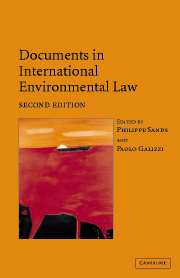Book contents
- Frontmatter
- Contents
- Preface
- PART I General instruments
- PART II Atmosphere
- PART III Oceans: global
- 8 London Convention on the Prevention of Marine Pollution by Dumping of Wastes and Other Matter, 29 December 1972
- 8A Protocol to the Convention on the Prevention of Marine Pollution by Dumping of Wastes and Other Matter, 7 November 1996
- 9 International Convention for the Prevention of Pollution from Ships, 2 November 1973
- 9A Protocol of 1978 Relating to the International Convention for the Prevention of Pollution from Ships 1973, 17 February 1978
- 10 United Nations Convention on the Law of the Sea, 10 December 1982 (extracts)
- 11 Agreement for the Implementation of the Provisions of UNCLOS Relating to the Conservation and Management of Straddling Fish Stocks and Highly Migratory Fish Stocks, 4 December 1995
- PART IIIB Oceans: regional
- PART IV Freshwater resources
- PART V Biodiversity
- PART VIA Hazardous substances and activities: nuclear
- PART VIB Hazardous substances and activities: pesticides
- PART VIC Hazardous substances and activities: waste
- PART VII Human rights and the environment
- PART VIII War and the environment
- PART IX Trade and the environment
- PART X Environmental impact assessment and access to information
- PART XI Liability for environmental damage and breaches of environmental obligations
- PART XII The Antarctic
10 - United Nations Convention on the Law of the Sea, 10 December 1982 (extracts)
Published online by Cambridge University Press: 05 June 2012
- Frontmatter
- Contents
- Preface
- PART I General instruments
- PART II Atmosphere
- PART III Oceans: global
- 8 London Convention on the Prevention of Marine Pollution by Dumping of Wastes and Other Matter, 29 December 1972
- 8A Protocol to the Convention on the Prevention of Marine Pollution by Dumping of Wastes and Other Matter, 7 November 1996
- 9 International Convention for the Prevention of Pollution from Ships, 2 November 1973
- 9A Protocol of 1978 Relating to the International Convention for the Prevention of Pollution from Ships 1973, 17 February 1978
- 10 United Nations Convention on the Law of the Sea, 10 December 1982 (extracts)
- 11 Agreement for the Implementation of the Provisions of UNCLOS Relating to the Conservation and Management of Straddling Fish Stocks and Highly Migratory Fish Stocks, 4 December 1995
- PART IIIB Oceans: regional
- PART IV Freshwater resources
- PART V Biodiversity
- PART VIA Hazardous substances and activities: nuclear
- PART VIB Hazardous substances and activities: pesticides
- PART VIC Hazardous substances and activities: waste
- PART VII Human rights and the environment
- PART VIII War and the environment
- PART IX Trade and the environment
- PART X Environmental impact assessment and access to information
- PART XI Liability for environmental damage and breaches of environmental obligations
- PART XII The Antarctic
Summary
Editorial note
The 1982 UN Convention on the Law of the Sea (UNCLOS), negotiated under the auspices of the Third United Nations Conference on the Law of the Sea, aims to establish a comprehensive legal regime to govern activities in and in relation to the world's seas and oceans. The selected Articles reproduced below are directly concerned with natural resources and the marine environment. Much of the Convention is considered to be declaratory of customary international law. The Convention's comprehensive definition of pollution of the marine environment (Article 1) has been used or relied on in subsequent agreements for the protection of the marine environment.
The Convention affirms the right of innocent passage in territorial waters, subject to certain limitations: passage loses its innocence if a foreign vessel engages in an act of wilful and serious pollution contrary to the Convention (Article 19(2)(h)), and coastal States are entitled to adopt the necessary laws relating to innocent passage for the purpose of, inter alia, the conservation of marine living resources and the protection of the marine environment (Article 21(1)). The Convention further provides that ships in passage must comply with international regulations for control of pollution (Article 39). The Convention permits States bordering straits and archipelagic sea lanes to make laws to protect, inter alia, the environment against pollution (Articles 42, 43 and 54).
The Convention establishes a regime of access to natural resources depending on where the activity takes place: within a State's exclusive economic zone (EEZ) or on the high seas.
- Type
- Chapter
- Information
- Documents in International Environmental Law , pp. 294 - 335Publisher: Cambridge University PressPrint publication year: 2004
- 2
- Cited by



